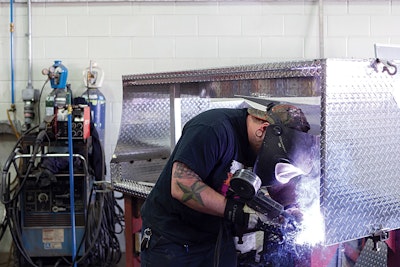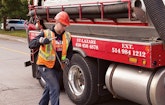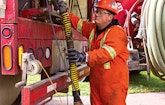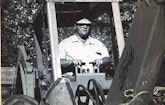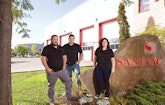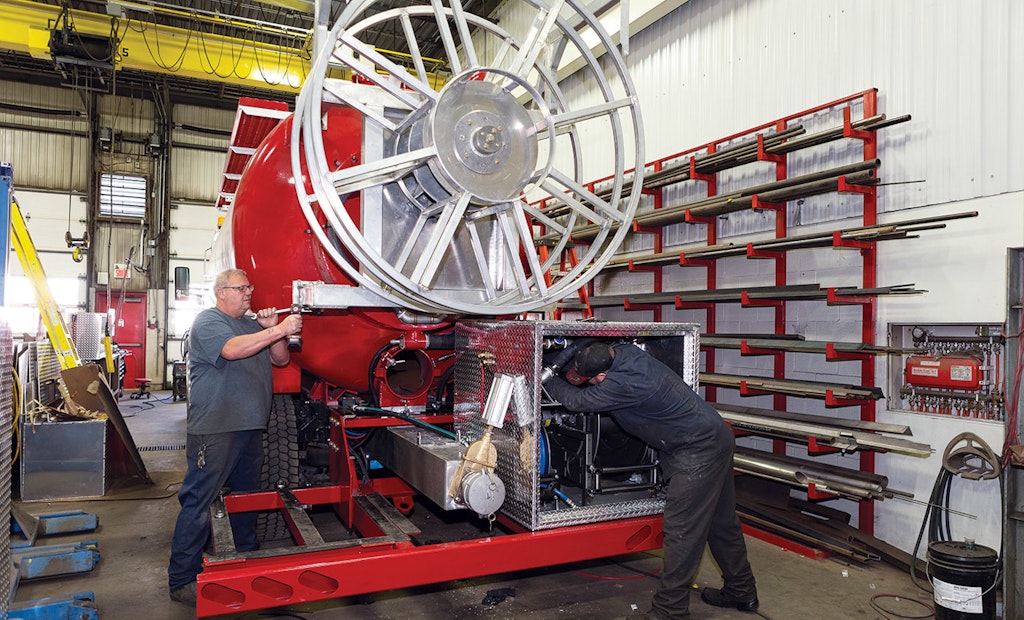
Michel Paquette, left and his son, Michel Paquette, Jr., assemble a hose reel and storage box in the fabrication department at Sanivac. The tank was built by Transway Systems and carries a Fruitland pump.
In 1961, when a Canadian printing technician/part-time policeman got frustrated with how long it was going to take to get his septic tank serviced, he got an idea of how he could follow his dream of small-business ownership. John Kelly bought a used truck, enlisted the help of his wife, Josée Serrurier, and created Sanivac.
The business was a success, but he quickly learned the hard way that an old heating oil tank was not going to work. In the 1970s he was joined by sons, Mark, Dennis, Patrick and Daniel, and by 1987 he was ready to pass the business on to them. Under their leadership, the business continued to grow and new services were added.
By October 2017 the brothers were ready to step down and let the third generation take over. Vincent, David and Carole-Ann Kelly — all under 35 years old (the average age of their 160 employees) — are now running the show. While maintaining the workplace culture started by their grandfather, the younger generation is putting their own stamp on the enterprise and operating with tools and practices of the 21st century.
One carry-over trait through the generations is a passion for innovation and problem-solving. The company creates solutions to company and customer needs, and a team of mechanics, electricians, welders and assembly personnel carry them out.
The company is located in Notre-Dame-de-l’Île-Perrot, Québec, a town of about 11,000 on a small island just west of Montréal. They have a working radius of about 60 miles.
SERVICE LINES
Sanivac no longer provides snow removal and septic installations, but the streamlined operation now includes portable restroom rental, septic tank and grease trap pumping, and sewer cleaning. Septage is hauled to the company’s facility, transferred to tankers and taken to government-approved treatment plants.
The company has more than 5,000 PolyJohn portable restrooms (blue for construction and gray for events) and a sizeable number of wheelchair-accessible units, as they’re now required in city parks. The company does over 4,000 weekly cleanings. Other equipment includes three refurbished restroom trailers and about a dozen PolyJohn five-station hexagonal urinal units.
A major portion of their work is for construction accounts. A couple of their biggest events include Marathon Oasis de Montréal, the largest running event in Québec (500 units), and the Montréal Grand Prix — 500 units, all cleaned daily in three hours with the assistance of some of their sewer cleaning trucks.
On the sewer side, the company has a number of municipal contracts to service and pump city systems. They also have private-sector construction accounts. Services include drain cleaning, thawing frozen pipes, unblocking sanitary lines, and maintenance of pumping stations and manholes.
The septic division benefits from the requirement in Québec that tanks be pumped every two years. In many places, companies bid on municipal contracts to provide the service to an entire town or county. “We send letters to all the residents and tell them we’re going to be in their area between this date and this date, then we pass house by house,” Carole-Ann Kelly says. Each team — a driver and a helper — services 20 to 25 tanks per day. The grease trap division collects grease from commercial, industrial and restaurant customers.
CREATIVE PROBLEM-SOLVING
The company moved to an industrial park in 2001, added a second building in 2006 and then tripled its size in 2011, and is currently building a third garage. The company will have space to park 100 trucks indoors. There are also facilities to clean all trucks daily. But more room is needed so all vehicles can be kept inside for protection against the weather. They currently rent extra garage space, but a third garage is under construction that will house 33 trucks.
A team of 12 works in a fully outfitted shop to repair and modify portable restrooms for specific needs. For example, since 2015 the provincial code has required that portable restrooms on construction sites with more than 25 employees have flush toilets, sinks with hot water, towels and soap.
The company’s first idea to accomplish this was too expensive for smaller contractors so they went back to the drawing board, even renting a 53-foot freezer truck to try out ideas in. The end result was what they call Ecosan — a PolyJohn Fleet flush unit with a sink to which they added ambient heating, a cover around it, sprayed Styrofoam underneath, and a heating element in the sink and electrical box. “There was a revolution in the chemical toilet here in Québec after that law passed,” Kelly says. “All that we buy now is that kind of toilet. That is the future of the sanitary toilet.” The company has now built 700, all rented out.
Another company-designed unit for use at events is a solar-powered, eight-sink hand-wash trailer with reservoirs for freshwater and graywater.
BUILDING THE FLEET
The company’s creativity also extends to its truck fleet. They have 140 license-plated vehicles including vacuum trucks (mostly Kenworth chassis and tanks from Transway Systems, Omega Liquid Waste Solutions and Supervac), 9,600-gallon tankers (Acro Trailer), company-built equipment transport trailers and delivery trucks (Kenworth and Hino). Pumps and blowers are from Robuschi (Surpresseur 4S) and Fruitland.
Most trucks are built out by the company. The Kellys know the specific requirements of each vehicle since they have operated all of them at some point in their lives. They also consult with operators to ensure a truck precisely suits their needs.
“Our assembly team can create whatever comes to our mind,” Kelly says. “No two trucks are the same. We always think each truck is the model for the ones to follow, but we always find something to improve. It takes time, but the truck will be perfect when it is ready.”
As one example, in the portable restroom division, after receiving the chassis and tank it’s typically another two months in the garage to assemble and adjust it to their standards, Kelly says. “It’s important that the truck is ergonomic and user friendly.”
ON THEIR OWN
Rather than having the third generation ease into ownership roles over time, the Kelly family decided the best way to do the transfer was overnight. “One day they were owners and doing everything, and the next day they were advisors,” Kelly says of their predecessors. “It worked very well. I don’t see how else we could have done it because they were so used to having their business.” While Mark and Daniel are fully retired, Patrick and Dennis work on projects that appeal to them.
The three younger Kellys are equal partners, each with different strengths and areas of focus. Carole-Ann Kelly takes care of administration and sales and marketing; Vincent Kelly handles the septic, grease and portable restroom divisions; and David Kelly oversees the pumping division. Working together is both challenging and second nature to them.
“It’s something we’re used to since 1961, so it’s in our blood,” Carole-Ann Kelly says. “I could not even see myself not working with the family. But we’re not always with a big smile on our face to each other. We do argue a lot in the background and challenge each other. But that’s how we succeed. And what makes things work is we don’t hold grudges; we like each other and we’re family.”
While customer service and employee care are enduring company commitments, the three new owners rewrote the values, mission and vision statements.
“We wrote something that really means something to us and that we want to apply every day,” Kelly says. “It’s not just words we put together. It’s what is tracing our path.” She says their goal is not to be the biggest company but to be the best. “We’re always there for our customers. Whatever needs or requests they have, we will always say ‘yes.’ It’s such a big no-no here to say ‘no.’”
GOOGLE BUSINESS MODEL
Kelly says there is a severe labor shortage in their area, but they work hard to attract workers. “We have a very good employer reputation,” she says. “It’s still a hard job to find employees, but we put our energy to it. We just attended a panel on the employee shift and we were given as a model for recruitment.”
The company’s new value statement includes the phrase, “pleasure at work” — a commitment to employee well-being. “Pleasure is very important here,” Kelly says. “We want to have fun doing what we do because we spend more time here than with our own families. And it helps us for everything — for sales, recruitment — just to show how life is here.” Kelly says they aspire to be the Google of the wastewater industry — not because they want to be the biggest, but because of the way Google treats people, the way they work and how outsiders view them as leaders in the industry.
In addition to good wages and benefits, Sanivac provides training and paid tuition for helpers to get their commercial driver’s license. They throw a number of parties during the year including one for kids and grandkids at Christmas, complete with a gift-bearing Santa. The field staff is provided with full uniforms including hats, hoodies and winter boots (“Everything but socks and boxers”), while the office staff has a comfortable “anything goes” dress code.
Sanivac is not just a work environment, it’s a life environment, Kelly says. “It’s very important that everyone is happy. We are a family company, and we want to keep that spirit, whatever size we become. It’s the way my grandfather would be happy that we do things.”
Going green
Recycling rainwater and snowmelt is just one way Sanivac tries to be eco-friendly. “We recover all the water that’s coming on our roof,” explains Carole-Ann Kelly, a partner in the business. “We have six reservoirs for accumulating the water. We also have a well. That keeps us from using the potable water from the city. Each year, I think it’s (3.7 million gallons) of freshwater that we’re saving.” The water is used in every area of their business.
The grease trap division is another area where they are committed to ecological responsibility. They first dewater the grease at their facility using a company-designed and -built system, then take it to treatment plants that produce biomethane. “The grease is reused and given a second life,” Kelly says. “The gas that’s produced, biomethane, is running generators, and these generators are selling the electricity on the grid.”
Other green efforts include using biodegradable paper in their portable restrooms. And in the office, they recycle everything they can. But they want to go one step further. Their current challenge is to go paperless. “A lot of our work orders are still printed, but we’re working on a solution so all trucks will be tablet-equipped and paperless,” Kelly says. “We try to be as eco-friendly as possible.”
